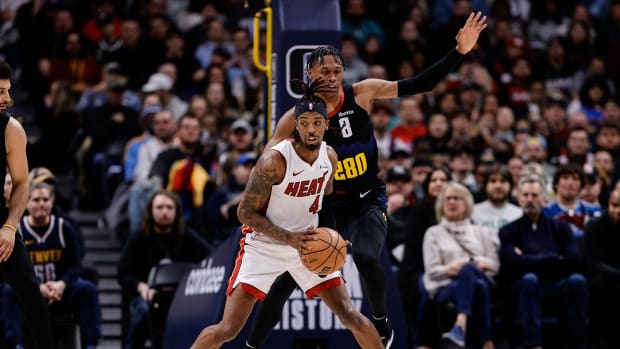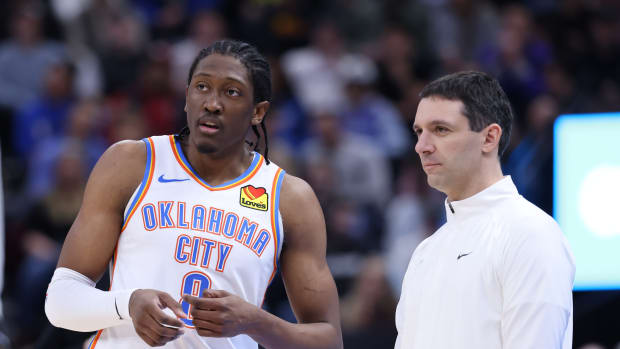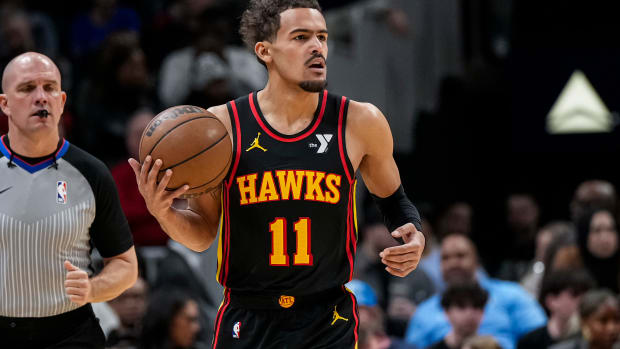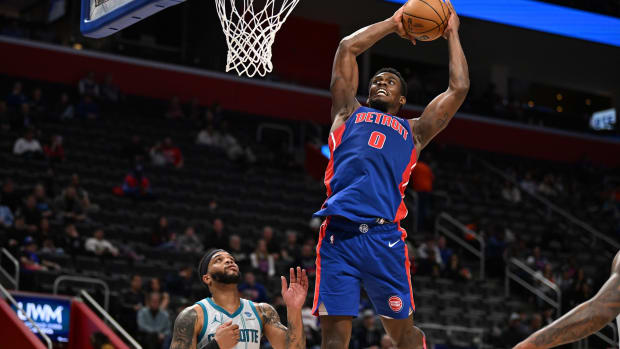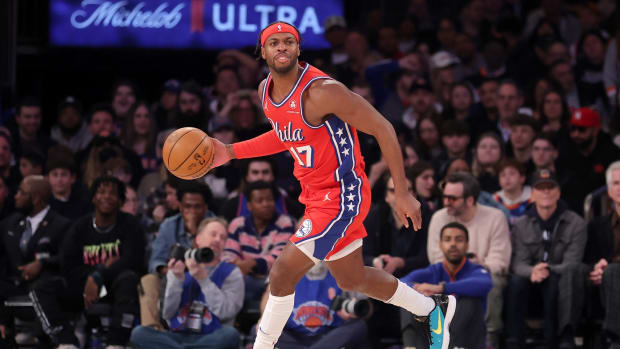Ready-Made Rookies: Ten NBA Newcomers Worth Watching
The NBA’s biggest story on draft night didn’t involve any rookie. It was the heist that shipped Jimmy Butler to Minnesota. None of the players selected in the first or second round will boost their teams right away like the 27-year-old Butler, but many of the rookies will get enough immediate run to show what they can do. Others will attempt to claw their way into playing time as rotation reserves, and a smaller number will have to overcome even more obstacles to make a dent.
Summer League offered some clues about newbies are ready for the bright lights, and a handful of teams are counting on them to provide depth from Day 1 at certain positions. With that in mind, the Crossover is highlighting 10 rookies capable of making an instant impact this season.
Dennis Smith Jr, Mavericks
There’s a chance Dallas snatched the best point guard in this class, even if he was selected after four other players at his position (MarkelleFultz, Lonzo Ball, De’Aaron Fox, Frank Ntilikina). One of the biggest criticisms of Smith entering the draft was that he didn’t play hard during his lone season at NC State, but he was basically fending for himself with a weak supporting cast in college basketball’s most challenging conference. Smith still managed to roast Duke for 32 points and six assists in the Wolfpack’s first road victory over the Blue Devils since 1995 and win the conference’s freshman of the year award. More importantly, by the end of the season Smith was showing no lingering effects of the ACL tear that sidelined him for his senior year at Trinity Christian (N.C.) School. Dallas can offer Smith an environment more likely to draw out his best effort on both ends of the floor every time he takes the court. The Mavericks are led by one of the league’s most respected head coaches in Rick Carlisle and their lineup is anchored by no-nonsense veterans like Wesley Matthews and Harrison Barnes. Dallas didn’t splurge on a PG in free agency this off-season, and Yogi Ferrell projects more as a backup than a starter. The Mavericks should hand Smith the reins to the offense without blinking.
Donovan Mitchell, Jazz,
The Jazz’s deal to move up and snag Mitchell looked like a prudent move on draft night, and it feels like a home run after watching Mitchell kill it during summer league. His promising performance was exactly what Utah needed to get over the letdown of losing Gordon Hayward to the Celtics. Mitchell can’t replace Hayward, but he should be able to help keep the Jazz in the hunt for a postseason berth in the loaded West. Utah has no high-level shot creators in its rotation, so it's best off trying to suffocate opponents in low-scoring slogs. With Mitchell badgering opposing 1s, 2s and even 3s, the Jazz can shoot for a repeat of their No. 3 ranking in defensive rating a year ago. He’ll also offer head coach Quin Snyder flexibility in sorting out a crowded perimeter rotation. Mitchell can handle the ball as a play-starter, or he can serve as more of a complementary threat. His offensive compatibility with non-shooters like Dante Exum and Ricky Rubio is dubious, but Mitchell flashed an improved three-point stroke during his sophomore season at Louisville. Even if he needs some time to adjust to the NBA line, Mitchell can contribute in too many other ways for Snyder to keep him off the floor for long stretches.
NBA Rookie Superlatives: Most Likely to Succeed and More
Frank Ntilikina, Knicks
When the Knicks took Ntilikina at No. 8, Phil Jackson was still calling the shots in the font office, and there was no expectation that a 25-year-old point guard with a Finals Game 7 dagger on his résumé would have any interest in coming to New York. The assumption here is that the Knicks won’t swing a deal for Kyrie Irving by the start of the season. If that holds, New York can put Ntilikina in charge of its non-Triangle offense and let him work through his mistakes. It won’t be an ideal setup for the youngest player picked in the first round this year, even if Ntilikina does have experience playing professionally overseas. Ntilikina’s defensive upside and court vision make him an attractive prospect long-term, but ideally he’d be brought along slowly while continuing to develop his 6’5" 190-pound frame. Instead, after handing shooting guard Tim Hardaway Jr. a godfather offer and settling for Ron Baker and Ramon Sessions at point guard this offseason, the Knicks will probably end up throwing Ntilikina into the fire sooner than later. Having Kristaps Porzingis around as a pick-and-roll partner should ease the growing pains.
Josh Jackson, Suns
For now, it seems like the Suns intend on keeping Jackson rather than ship him to Cleveland (or a third team) in a hypothetical Kyrie Irving trade. If he does stay in Phoenix, Jackson looks ready to step in and terrorize opposing wings with his relentless ball pressure immediately. Defense was his calling card at Kansas and it should be the end of the floor in which he finds the most success as a rookie. Jackson's offensive ceiling will come down to whether he can improve as a long-range shooter. He needs to clean up his form, and he made only three of his 16 attempts from deep over five games at Summer League. On the long list of “if only he can develop a jumper” draft hopefuls, Jackson may end up more like Michael Kidd-Gilchrist than Kawhi Leonard. In the short term, Jackson will join a young nucleus without a clear headliner. There’s some potential in a Jackson-Devin Booker wing tandem, though, with Jackson’s viselike coverage compensating for the sweet-shooting Booker’s defensive deficiencies. Jackson’s first season will offer an indication of what that duo could look like a few years down the line.
John Collins, Hawks
New Hawks GM Travis Schlenk struck one of the offseason’s worst trades when he accepted Miles Plumlee’s bloated contract from the Hornets in a Dwight Howard salary dump. He also may have made one of this year’s best draft picks by plucking Collins in the back half of the first round. Collins’s post-oriented game may have scared off some teams worried about whether he’d find his place in a league increasingly in love with three-point shooting and spacing, but Collins was super-productive as a sophomore at Wake Forest: He ranked first in the ACC Win Shares per 40 minutes and led D–I players with a 35.9 PER. It's obvious Collins wouldn't maintain that level of output in the NBA, but there is hope he’ll be able to make a smooth transition into a rotation piece. The early evidence is encouraging. Over five Summer League games, Collins averaged 15.4 points and 9.2 rebounds while shooting nearly 60% from the floor. By dealing Howard and moving on from Paul Millsap, the Hawks seem to be pivoting toward a youth movement. Collins could be the frontcourt anchor.
Justin Jackson, Kings
The Kings spent the offseason adding seasoned veterans (George Hill, Zach Randolph, Vince Carter) to a young roster still a few years away from making a playoff push. But aside from nabbing graybeard Carter on a one-year deal, Sacramento mostly left Jackson’s projected position (small forward) unaddressed. The Kings did well to snatch Jackson for their frontcourt rotation after trading down in the draft. He seems like a better option to play next to Buddy Hield than last year’s first-round pick, Malachi Richardson, who’ll need to fight for playing time after missing the final 25 games of last season with a partially torn hamstring. Jackson will do a lot less winning in 2017-18 than he did as the co-star on North Carolina’s title team last season, but he should acquit himself well early on as a floor-spacer and team defender, and it’s easy to see him growing into a dependable 3-and-D cog. EuroLeague standout BogdanBogdanovic, whom Sacramento signed to a three-year, $27 million deal this summer, could have earned a spot on this list at Jackson’s expense, but the Kings seem committed to Hield as a franchise cornerstone at shooting guard after acquiring him as the centerpiece of their return in the DeMarcus Cousins trade.
LonzoBall, Lakers
No rookie commanded more attention than Ball this summer, and the Big Baller Brand train should pick up steam once he suits up in NBA games that actually count. Ball is a mesmerizing playmaker with uncanny timing and accuracy. Even if he’s never able to consistently manufacture shots off the dribble or make more than a third of his threes, Ball’s ability to push the pace and rifle on-target dimes will have plenty of fans defaulting to the Lakers as their go-to League Pass team by the end of his rookie season. Los Angeles doesn’t own its first-round pick in next year’s draft, so second-year coach Luke Walton can ignore lottery odds and let Ball run and gun in an improved rotation featuring new additions Brook Lopez and Kentavious Caldwell-Pope. Yet as important as what Ball does on the court is to the Lakers’ future, the most interesting part of his first year as a pro will be the circus he creates off of it. Lonzo’s boastful father, LaVar, has only elevated his profile this summer, and there’s no telling how he’ll handle, say, Walton limiting Lonzo’s minutes during a prolonged slump. You’ll want to catch as much of this 82-volume drama as possible.
Malik Monk, Hornets
The Hornets lucked out when Monk fell to them at No. 11, but aside from some brash talk about taking Michael Jordan in a game of one-on-one, their back-end-of-the-lottery steal has mostly stayed out of the news while recovering from a minor ankle injury that forced him to miss Summer League. Charlotte has a big-money veteran (Nicolas Batum) entrenched at shooting guard and a vastly underpaid All-Star (Kemba Walker) at point guard. Slotting Monk next to Walker would give Charlotte enough three-point firepower to give most defenses fits, but that pairing would hemorrhage points, even if defensive guru Steve Clifford manages to hide one or both of them enough to limit the damage. The Hornets picked up Michael Carter-Williams on a one-year pact to serve as Walker’s backup, but Monk could be a better alternative when Walker sits. That said, Monk is definitely better suited running defenders in circles while working off the ball, at least for now. It’s up to Charlotte to figure out how to find ways to deploy his three-point marksmanship without giving up too much on the other end of the court.
Markelle Fultz, PG, 76ers
Sixers fans held their collective breaths when Fultz went down with an ankle injury during Summer League. But rather than joining Ben Simmons and Joel Embiid as recent Philly lottery picks to delay their debuts, Fultz seems like he’ll be good to go for opening night. He looked up to speed in the limited amount of court time he did get in Salt Lake City and Las Vegas, so he should hit the ground running as one of the primary playmakers on a Sixers team with a real shot at making the postseason. Whether Fultz will be playing his college position, and the one scouts listed him as throughout the pre-draft process, is a more complicated question. Fultz is a point guard, but LSU product Ben Simmons, the No. 1 pick in last year’s draft, was quoted this summer as saying that he is a “starting point guard.” Focusing on the PG label is probably a waste of time. Fultz and Simmons can co-exist: They both score and pass well, they both can initiate offense and they should be able to find a healthy balance divvying up shots and sharing ball handling responsibilities.
Milos Teodosic, Clippers
At 30, Teodosic is by far the oldest player on this list, and also the most likely to cause you to stop whatever you’re doing and commence an hour-long YouTube mission. Anyone who’s caught Teodosic with the Serbian national team in international play is familiar with his passing creativity. Now we’ll get to enjoy it for at least one full season. (He signed a two-year, $12.3 million deal with a player option on the second year.) Teodosic wrong-foots defenders expecting the ball to go one way, only for him to whip it around his back and have it fly out in a different direction. And whereas amateurs try to score highlight points with after-the-fact head turns on no-look dimes, Teodosic regularly delivers the genuine article. He’ll be a joy to watch; the only downside is that he didn’t get over to the league earlier in his career. The Clippers almost definitely won’t ask Teodosic to man the point by himself. He can fill in behind Chris Paul trade acquisition Patrick Beverley, and Doc Rivers shouldn’t have any reservations about rolling them out together at the same time. Teodosic will get worked trying to keep track of the West’s battery of top-level floor generals, but Beverley is a stifling defender who can spare his PG partner the most challenging backcourt assignment.

































